They're young, but they're no rookies: More kids in Singapore playing chess competitively
Spurred on by the intellectual challenge and enjoyment of the game, more young children in Singapore are picking up chess.
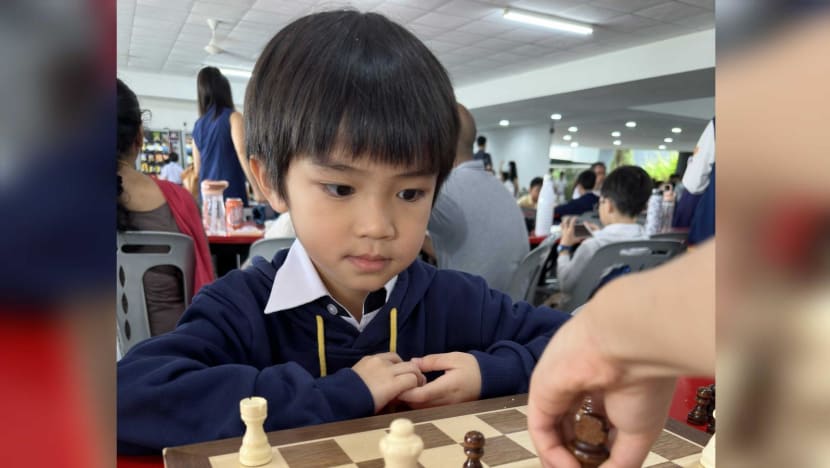
Six-year-old Lucas John Wee is the youngest member of the national training programme for junior chess players. (Photo: Jessica Wee)
SINGAPORE: A chess game may seem still and silent from the outside, but when nine-year-old Alesa Wong is battling an opponent for control of the board, her mind fills with “blasting colours”.
“There are a lot of noises inside a chess player’s mind, just that nobody can hear it,” the junior chess player told CNA. “It’s extremely exciting, and my heartbeat races when I know I've made a brilliant move.”
Alesa, who started playing chess when she was seven, is part of a newly established national training programme for young chess whizzes.
In the past months, the influx of young minds to Singapore’s chess community has become more noticeable.
A record 1,365 players competed in the 74th National Schools Individual Chess Championship in March. There could have been more, but some would-be competitors were turned away as the venue was not big enough.
Then in April, the Singapore Chess Federation launched the national training programme to nurture the country’s next generations of chess talent.
The programme comprises an under-10 squad with 14 members and an under-14 squad with 18 members. The youngest of the entire bunch is six-year-old Lucas John Wee.
Fidgety young Lucas becomes serious and focused when he is playing chess – a part of his personality that his family usually does not get to see, his mother said.
When asked why he enjoys playing chess, Lucas said simply: “I get to relax.”
That may be surprising to hear considering he trains for 10 hours a week. Other children in the squad can spend up to 16 hours a week on chess, with thrice-weekly sessions under the national training programme, one-to-one private coaching and self-study.
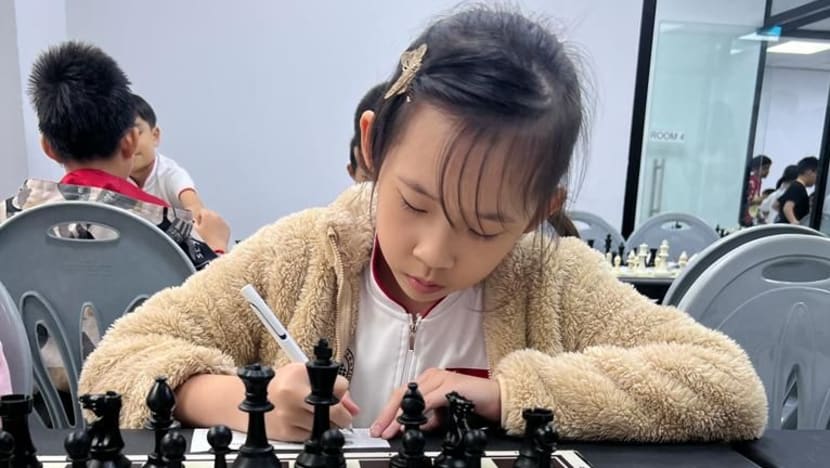
To get into the programme, the youths were selected by a committee that reviewed their recent chess results. They are considered first for national representation at competitions, ahead of the chess federation's high-performance squad.
For Mia Wang, learning that she was good enough to be part of the team was unexpected. Joining the squad has boosted the soft-spoken nine-year-old’s confidence in her abilities.
“I just hope to be a better player than when I was younger,” she said, when asked about her dreams for her future in chess.
WHY CHESS?
Singapore Chess Federation CEO Kevin Goh said that the number of people showing interest in its chess courses and tournaments has grown by about 50 per cent in the past year.
The federation is the principal authority over all chess events in the country, and a member of the Singapore National Olympic Council and Singapore Sports Council.
But the number of chess events held by independent organisers also rose by about five times compared with the previous year, said Mr Goh.
He attributed the rise in interest to the COVID-19 pandemic, when more people turned to chess as a pastime. Barriers to entry are “extremely low” as the game can be played almost anywhere and even alone, so long as there is internet access.
Chess’ cultural reach also expanded with hit Netflix series The Queen’s Gambit, which inspired a surge of interest when it was released in late 2020.
Alesa, Lucas and Mia all started playing chess during the pandemic, with Mia in particular starting after her parents watched The Queen’s Gambit, her father said.
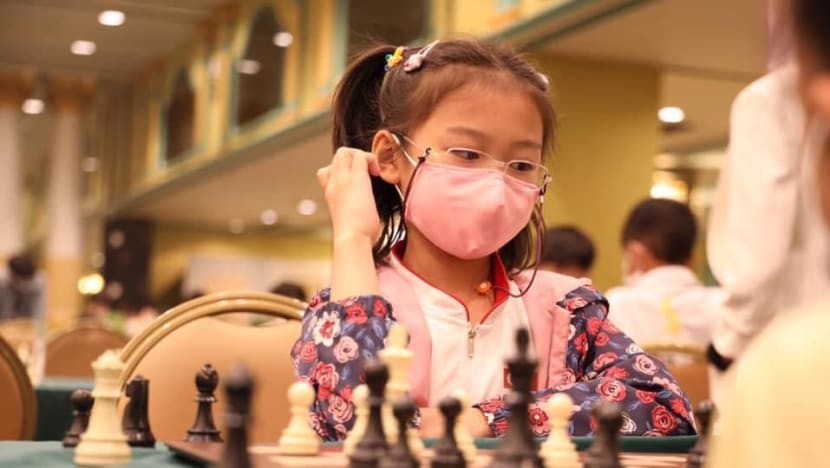
Parents tend to be attracted by the cognitive gains from chess. Lucas’ mother said she believes in “brain training”, while Mia’s father said he was looking for an intellectual activity for his daughter to pursue.
But for chess playing to be sustainable, the children must ultimately enjoy it, especially when schoolwork and other extra-curricular pursuits compete for their time and energy.
“It’s important to make sure that learning chess is a fun process, or else it becomes a lot like school. We shouldn’t make chess like a textbook,” said Mr Goh.
Alesa’s father initially thought she would give up chess to focus on school, but was proven wrong. “She basically said no, she’s really into chess and she wouldn’t let us give it up,” he said.
The young girl wants to eventually become a grandmaster. When asked to envision a future in which she grows up and tires of playing chess, she said confidently: “That will never happen.”
Lucas has even bigger ambitions to be a world champion, but knows he has some ways to go, as he excitedly recounted for this reporter the time he almost drew with grandmaster Mr Goh in a game.
Despite their talent, the kids must also learn how to cope with failure and disappointment. They each have their own ways – Alesa practises meditation, for example.
Mia gets nervous when she plays because she does not want to do badly. But if she loses, “I just calm down, and then do something else”, she said.
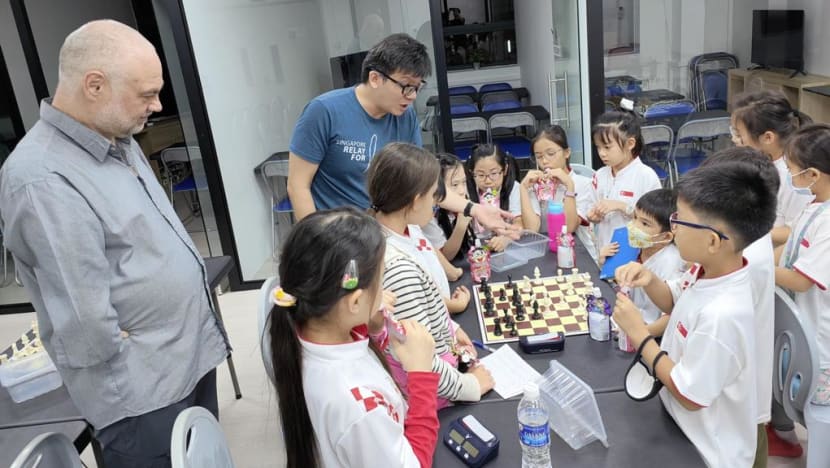
Given the cognitive and character-building benefits from chess, its growing popularity has also spread to schools, where some are seeing more interest in chess clubs and admission can be selective.
Kent Ridge Secondary School’s chess club started out as an informal interest group formed by a few teachers and students in 2021.
When students started bringing their own chess sets to the canteen to play during breaks, the school decided to give them a proper space to use. The chess club became a co-curricular activity (CCA) earlier this year.
Hwa Chong Institution and Raffles Institution both told CNA they have seen growing demand from students to join the mind sports or chess CCAs.
Ms Teri Chua, teacher-in-charge of Hwa Chong Institution’s mind sports club, said chess combines a “relatively low skill floor” – so students can view it as a form of leisure – with a “high skill ceiling” for which experienced players can strive.
LESSONS FROM CHESS
One important lesson from chess is learning to bear the consequences of one’s actions, Mr Goh said.
“If you’re careless, you make a careless move and you lose the game, you can’t fault your coach, you can’t fault your parents. You have nowhere to hide, you have to face the consequences yourself.”
Mr Goh, 40, became a grandmaster in 2020. At the time, he was only the third Singaporean to reach the highest title that a chess player can attain. Titles are awarded by the International Chess Federation (FIDE) and held for life.
Singapore has four grandmasters, with Mr Tin Jingyao becoming the most recent player to join their ranks at the age of 22 last year.
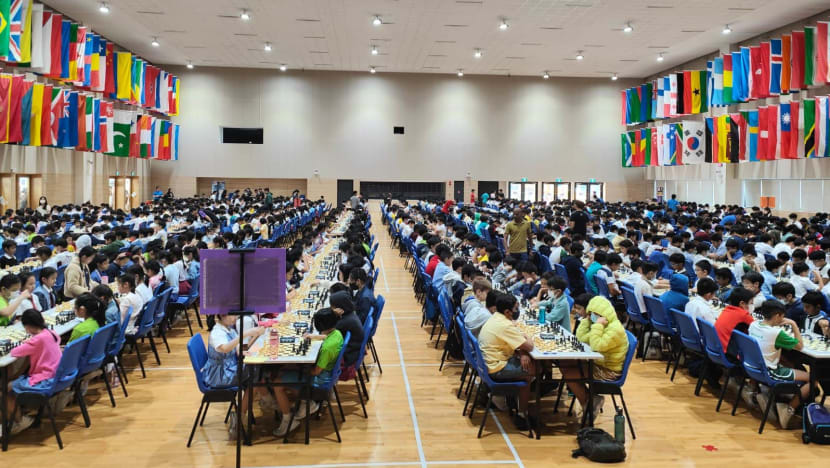
A former chief financial officer in a biotech start-up, Mr Goh left his job at the end of 2022 to concentrate on the federation full-time.
The game strikes a personal chord – as a young boy, he played chess when he could have “easily made the wrong type of friends” and been involved in gangs.
“Chess kept me out of trouble,” he said. “If you’re so focused on learning chess, and you find the game so enjoyable, you just will not be able to pick up other bad habits.”
Mr Tan Weiliang started playing chess with his father when he was seven or eight years old, and continued through his teens to reach the rank of candidate master.
Now 30, the PhD candidate in applied economics at Cornell University said he no longer has time to play chess, but credited the sport with benefits that have served him in other ways.
“Chess encourages and rewards hard work,” he said. Playing a standard chess game also requires concentrating for three to four hours at a stretch – a skill that Mr Tan said helped when studying for exams.
Serious chess players memorise sequences of moves, such as openings. Yet chess is also an art that promotes creativity and thinking out of the box, he added.
A SPORT FOR ALL
Even as the Singapore Chess Fedetaion is concentrating more resources on young players who show precocious talent, it also aims to broaden the reach of the sport.
Mr Goh is encouraged that more than half the U-10 squad is female. “These young girls are the future,” he said. Chess remains dominated by men – as of May, there are no women in the world’s top 100 players ranked by FIDE.
The federation has also roped in German grandmaster Thomas Luther, chair of FIDE’s Players with Disabilities Commission, to help push its engagement of people with disabilities.
“Unlike most other sports, the rules of chess are the same whether you are an able-bodied person or whether you have a disability,” said Mr Goh.
The federation aims to grow the number of para-athletes playing chess in Singapore, and create a more comfortable environment for them to join local tournaments.
Mr Goh ranks Singapore’s chess prowess at fourth in the region, with Vietnam, the Philippines and Indonesia as the strongest rivals. But he is not preoccupied with churning out grandmasters from among the youths.
“We are not going to say things like: ‘Oh, I think you have the talent to become a grandmaster or world champion one day.’ I think that’s not the right approach,” he said.
“My job is to make sure that chess will always be – at least during training – will be an enjoyable process. And they find the beauty of the game because there are so many things that they haven’t uncovered yet.”
Read this story in Bahasa Indonesia here.

















